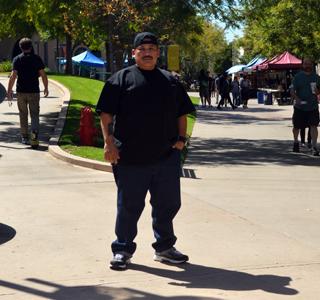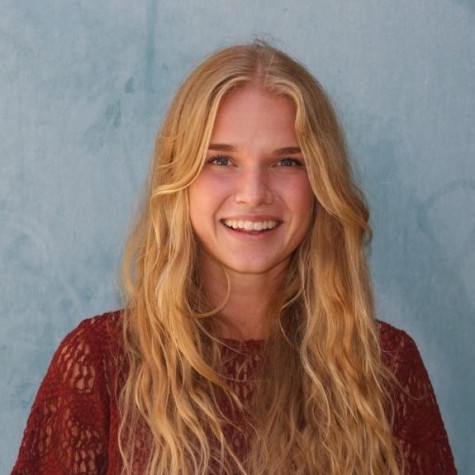It was on a car-washing Sunday in March 2013 that Robert Murillo, instead of getting a good night’s sleep, choked and coughed his way to the emergency room, where he found out he had a heart failure.
Murillo grew up in El Sereno, located in East Los Angeles, in a family of eight. The youngest of six kids, he grew up with an abusive father, forcing him to fast-track through his childhood and grow up fast. Getting beat up by his dad and seeing his mother receive the same treatment led him to seek ways to escape reality.
He started drinking at 11, smoking weed at 12, and joined a gang at 14. By 16, Murillo was already shooting heroin.
“I loved my mom so much and I didn’t want to see what happened to her, so I went out and got high,” said Murillo.
It was not until Murillo was 16, when he knocked his father down and hit him to the floor, that the abuse stopped.
“I told him ‘That is it,dude. I am not a little boy no more. Don’t you put your hands on me,’” he said.
Murillo became the protector of his family and took on some of the workload by sweeping a parking lot at a liquor store; however, alcohol was always in the picture.
“Where I grew up, with my family, that was the way to be,” he said. “We have a lot of family photos, and there is always beer cans in those photos.”
Murillo said that immersing himself in the wrong crowd and making poor decisions led to his two stints in jail. During his first arrest, he was charged with assault with a deadly weapon. The second time he was jailed was for physical violence, traffic warrants, and failure to appear in court.
Despite his troubled past, Murillo said he has always been a caregiver who cares more for others than for himself. His aunt through marriage, Rosemary Rosales, agreed.
“He will go out of his way for you,” she said.
As he grew older, Murillo felt more obligated to be there for his family, especially when tragedy after tragedy struck.
In 2010, his brother, Sammy, died of a brain aneurysm at the age of 55. Two years later, his sister, Rachel, died of leukemia at age 58. Four months after that, his other sister, Marylou, died of liver disease at the age of 60. Just six months later, he was struck with yet another loss when his mother, Luisa,79, died of heart failure.
“I used to go to sleep wishin’ it was all a dream,” said Murillo. “That I would wake up and they would all be there.”
Three months before his mom passed, Murillo was diagnosed with aortic valve insufficiency; however, rather than seek treatment, he decided to focus his time and energy on his mom.
Her last wish was to come home so, after a lot of debating with her doctors, he made it happen. He brought her home on a Friday afternoon, with family and friends waiting at the house.
“We said our byes and I told her to go to rest because she didn’t have to worry about nothin’ no more,” said Murillo. “She was home.”
When Murillo kissed his mother good night and told her to rest, she nodded her head, as a tear ran down her cheek. That was when he knew that she was ready to go, and that Sunday morning, she went.
“He has done everything for his mother,” said Rosales. “I wish everyone had a son like that.”
The loss of his mother combined with his own diagnosis led Murillo to abandon drugs and alcohol. He remains sober today.
“I didn’t want my mom to leave seeing her son still drunk,” he said.
A month after his mother’s death, Murillo was hospitalized for seven weeks. At this point, his condition had grown more severe. He knew he had Hepatitis C, but this caused a blood infection that led to a contraction of an endocarditis (an inflammation of the heart valves and chambers). This in turn caused him to develop Aortic Stenosis, which is a thickened wall inside the lower heart chamber that prevents a sufficient amount of blood from reaching the rest of his body. This eventually led to his heart failure.
Benjamin Salazar, the program director of the Alcohol and Drug studies program at GCC, stresses the consequences of all drug use and Murillo’s condition to be one of them.
“It is the domino effect,” he said.
It wasn’t until Murillo watched open-heart surgeries on YouTube and heard doctors, who performed the surgeries, stating the same facts that he had been told himself, that he realized the seriousness of his condition.
“That was the eye-opener,” he said. “I thought, I better start taking care of myself.”
When he started undergoing treatments, Murillo experienced great empathy from his doctors and counselors, a kind he had never before felt from complete strangers.
“[It was] the way they cared whether I lived or died,” he said.
This was when Murillo decided he wanted to be that person for someone else. He started the Alcohol and Drug studies program at the college, where he met Salazar. Salazar got Murillo a job as a counselor at the Right On Programs, a DUI center in Glendale. Murillo himself attained an internship at Huntington Memorial Hospital’s detox unit, where he received treatment 18 months ago.
Since Murillo hardly went to school before, attending college was quite an adjustment.
“I just threw myself into college,” he said. “I didn’t know what a ‘W’ was, I learned the hard way.”
According to Salazar, Murillo was indeed a bit “rough around the edges when he came.”
However, it did not take too long before he developed a newfound love for school.
“GCC has literally been my home away from home,” he said. “Here I am a different guy. It is like I am on a different planet.”
His goal is to earn his Associates Degree in Alcohol and Drugs studies in 2017, as his present heart condition has slowed down the process.
Salazar has come to know Murillo for his resilient personality and his ability to persevere through tough times. He has seen many recovering addicts fall back in old patterns but has faith in Murillo.
“He is just a good investment,” said Salazar. “He is just one of those students who is going to beat the odds no matter what.”
Ellen Oppenberg, a professor at the Center for Students with Disabilities, has come to her own conclusion about Murillo’s perseverance.
“He feels like he owes his mom to live a better life than he was leading,” she said. “And I believe he is going to do it.”
Over the years, with help from his sponsor, Bill Riley, whom he met at the college, Murillo has learned that expressing his feelings keeps him focused on the present.
“Before, I never showed my feelings,” he said. “The only thing I ever showed was anger.”
When Robert was not able to speak openly about his feelings, Riley advised him to write them down. The writing turned into rhyming and the rhyming turned into poetry.
“It comes from his heart,” said Rosales. “I never knew he had that talent.”
He has written about 35 poems and is gathering the courage to enter a poetry recital. He is most proud of the poem he wrote for his mother’s headstone. He never leaves home without his notebook and hopes to one day turn his poem collection into a book.
Though he has lost many people in his life, Robert is far from alone. He is a father of five and a grandfather of four. He currently lives in his mother’s old house with his spouse, Debra, and their 3-year-old dog, Pugsy.
He got Pugsy about a year after his brother passed, and it was when he learned that the dog was born on the same date as Sammy, Jan. 8, that he knew he had picked right.
Looking back at his life today, he has no regrets because it made him who he is today. However, watching old classmates strolling down the streets, pushing baskets, makes him glad for the changes he made.
“It makes me realize that the things I did didn’t make me a man,” he said. “I am a man today.” this is a man today,” he said. ”
Murillo’s transformation has gone “from a metamorphosis, this raggedy maf, to this butterfly,” said Salazar. “He would hate that, but it is true.”
Mentally, Robert feels like a new man; however, physically, he feels older than 46. With his shortness of breath and the reduced blood circulation in his legs, he is recommended to walk with a cane.
“But I am too young to walk around with a cane!” he said, though he found one handy in his younger years, as a weapon.
“My worst day now, I would still not exchange for the best day back then,” he said. “And I feel everything now, the aches and the pain.”
He wants to be remembered as a man who helped others recover, as a friend, a dad, a husband, and a guy who used to walk his dog – not the meanest guy in a gang.
“He realizes where his place is in this world now,” said Oppenberg. “I don’t think he knew before.”
In November, Robert has an appointment with a cardiologist at USC who will schedule his open-heart surgery. Due to his present condition, Robert has been given a 50 percent chance of survival; however, without the operation, his doctors estimate he only has two years to live.
After all the hurdles that Murillo has had already, “somehow this one seems a little bit smaller, you are in a hospital, you are safe, no one is shooting at you,” said Salazar.
Murillo stays positive and reckons a 50 percent shot on a longer life is better than two years.
“I believe that my work here is not done,” he said. “There are just too many more people for me to help.”


